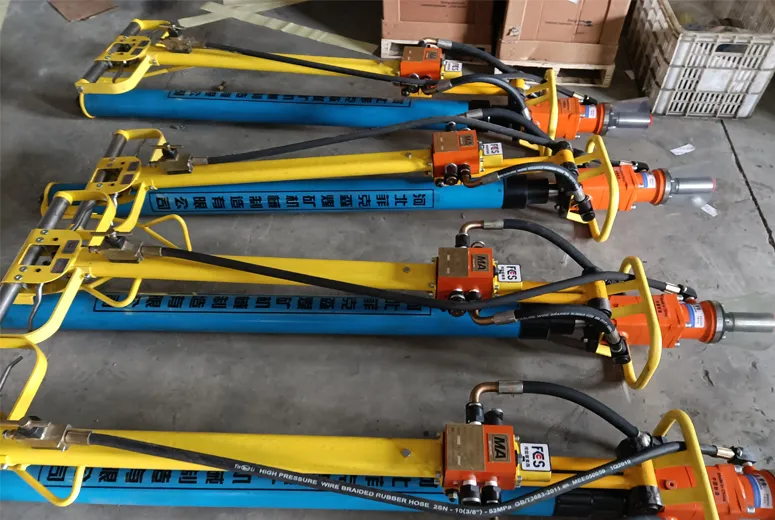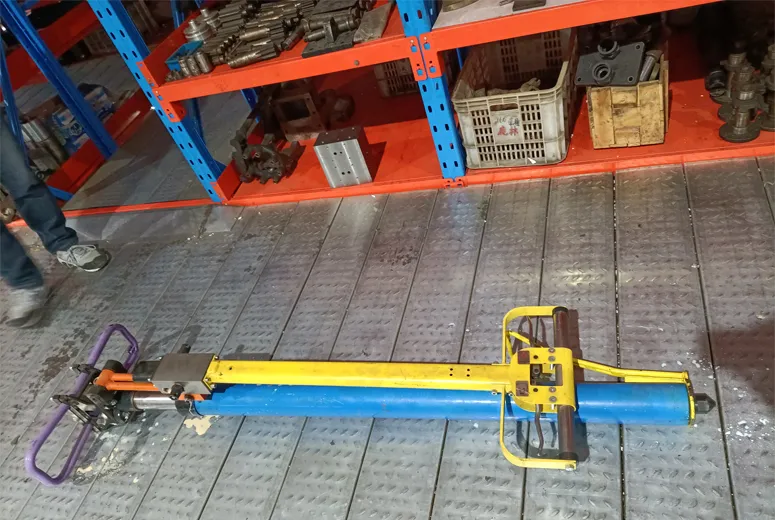Carlos Mendez
Underground Operations Manager, Andes Mining Ltd.
Here are three key features of a bolter with high torque and low noise:
High Torque Capability: The bolter is designed to deliver a high level of torque, enabling it to efficiently drive bolts into hard rock formations. This feature ensures fast and reliable bolting, even in difficult and resistant materials, enhancing productivity in mining and construction operations.
Noise Reduction Technology: The bolter incorporates advanced noise reduction mechanisms, such as soundproofing materials or specially designed motors and gears, to minimize the noise generated during bolting. This feature is especially important in underground mining environments where reducing noise exposure is essential for worker health and safety.
Durable and Robust Construction: The bolter is built with high-quality, durable materials that can withstand the harsh conditions of mining or tunneling operations. Its design typically includes reinforced components that are resistant to wear and tear, ensuring long-lasting performance in tough environments.
These features combine to make the bolter highly efficient, safe, and comfortable for use in various demanding environments.
Underground Mine Roof Bolting: The bolter is used for securing rock bolts into the roof of underground mines, providing essential structural support while minimizing noise levels to reduce worker exposure to high sound levels, which is crucial for improving safety and comfort in confined spaces.
Tunneling and Shaft Construction: In tunnel construction, where noise control is critical, a high-torque, low-noise bolter ensures that bolts are applied with precision and effectiveness, stabilizing the tunnel walls while keeping the noise level to a minimum, reducing disruption to workers and neighboring areas.
Slope Stabilization in Open-Pit Mines: The bolter can be used to install rock bolts on steep slopes or excavation sites to prevent rockfalls and landslides. The high torque allows the bolter to penetrate tough rock formations, while the low noise helps reduce noise pollution in sensitive or residential areas near mining sites.
These applications emphasize safety, precision, and reducing noise exposure for workers.




In underground mining and tunneling, roof stability is a primary safety concern. A hydraulic roof bolting machine plays a vital role in securing the overhead rock layers, preventing unexpected falls, and maintaining the long-term integrity of the excavation site. Compared to pneumatic systems, hydraulic drives deliver smoother torque, greater drilling control, and improved adaptability to different rock formations.
Hebei Fikesen Coal Mine Machinery Manufacturing Co., Ltd., based in Shijiazhuang High-tech Industrial Development Zone, has specialized in high-torque, low-noise bolting technology for years. Our designs integrate advanced hydraulic control systems capable of maintaining steady rotational force even when encountering variable-density rock. This consistency ensures that drilling depth, bolt insertion, and anchoring resin application are all performed with high accuracy.
The noise suppression benefits are equally important. In enclosed spaces, sound reverberation can quickly exceed safe hearing limits, impacting communication between workers. By optimizing gear mesh patterns, applying vibration dampers, and sealing hydraulic circuits, Fikesen’s machines maintain low operational noise levels without compromising power output. This improves both safety and operator endurance during long shifts.
Structurally, a hydraulic roof bolting machine is built for durability. High-strength alloy steel frames resist bending under load, while corrosion-resistant hydraulic fittings ensure reliability in moisture-rich mine environments. Adjustable booms and flexible drilling heads allow operators to secure roof bolts at various angles, making the machine suitable for irregular rock profiles or constrained spaces.
In application, these machines are used extensively in coal mining, tunnel lining, and hydropower projects. They offer the capability to install mechanical, resin, or expansion-type bolts efficiently. With precise torque control, operators can avoid overdriving bolts, which can damage surrounding rock and reduce anchor effectiveness. By combining robust hydraulic performance with noise reduction, these machines address both the engineering and human factors critical to underground safety.
Selecting the correct anchor drilling machine for mining or tunneling projects involves more than just comparing torque ratings. Each project’s geological conditions, space limitations, and safety requirements demand careful consideration. A well-designed drilling machine ensures not only efficient anchor installation but also long-term structural stability.
Hebei Fikesen’s approach to anchor drilling machine design emphasizes adaptability. Their machines feature adjustable drilling arms, enabling operators to install anchors from different angles without repositioning the base unit—an important advantage in narrow tunnels or irregular rock faces. The high-torque hydraulic drive maintains constant rotational speed even when transitioning from softer to harder strata, reducing the risk of drill bit lock-up.
Material selection is critical in ensuring long service life. Our use heat-treated alloy steel frames, abrasion-resistant drill rods, and protective casings for hydraulic lines. These components help the machine withstand the abrasive dust and high humidity common in underground environments. The integration of sealed bearings and high-efficiency hydraulic pumps further enhances reliability, minimizing maintenance downtime.
Noise reduction is also a key selection factor. Excessive noise can cause operator fatigue, miscommunication, and reduced productivity. By incorporating vibration-damping mounts and low-friction gear systems, Fikesen’s machines keep sound levels manageable without sacrificing drilling force.
Beyond mining, such machines are also used in slope stabilization, retaining wall reinforcement, and large-scale civil projects. The right anchor drilling system must balance power, precision, and durability. Fikesen’s combination of engineering expertise and adherence to ISO9001 quality standards ensures their drilling machines meet these demands, offering a practical and reliable solution for challenging ground conditions.
In tunneling and mining, stability reinforcement must often be performed quickly to prevent structural failures. A self drilling rock anchor provides a dual function—it drills and anchors in one continuous operation, eliminating the need for pre-drilled holes. This makes it particularly valuable in loose or fractured rock where borehole collapse is a concern.
Hebei Fikesen Coal Mine Machinery Manufacturing Co., Ltd. develops bolting and drilling equipment capable of installing self drilling rock anchor systems with high torque and low noise output. The machines are designed to handle hollow drill bars, through which grout can be injected during installation. This technique ensures the anchor is fully bonded to the surrounding rock, even in unstable ground conditions.
High torque capability is essential in this application, as it allows the drill to cut through mixed strata—ranging from clay-rich soil to hard rock—without losing penetration efficiency. Our hydraulic systems regulate torque to prevent sudden surges that could damage the anchor or the drilling assembly.
Low noise operation is a critical ergonomic advantage. In long tunnel sections, reduced sound levels make it easier for teams to communicate, improving coordination and safety. By implementing hydraulic cushioning, precision gearing, and optimized cutting speeds, we can ensure that performance is maintained without excessive noise output.
These anchors are widely used in urban tunneling, mine roadway support, and slope stabilization in open-pit mines. Their ability to both drill and anchor in a single process significantly reduces installation time and labor requirements. Additionally, the corrosion-resistant materials used in the anchor bars ensure long-term stability, even in moisture-heavy underground environments.
By combining purpose-built equipment with advanced anchor technology, Fikesen delivers solutions that address both the engineering challenges and the operational demands of modern tunneling projects.

Carlos Mendez
Underground Operations Manager, Andes Mining Ltd.

Elena Popova
Project Engineer, Baltic GeoInfra

Mark O’Connell
Mine Supervisor, Redstone Resources Inc.

Jürgen Stahl
Senior Geotechnical Consultant, Alpine Civil GmbH